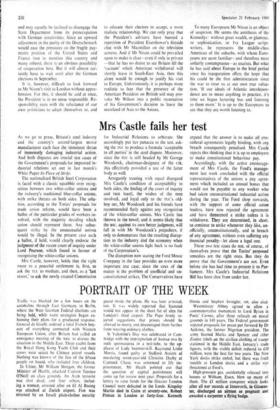Mrs Castle fails her test
As we go to press, Britain's steel industry and the country's second-largest motor manufacturer each face the imminent threat of immensely damaging industrial action. And both disputes are crucial test cases of the Government's proposals for improved in- dustrial relations set out in last month's White Paper lit Place of Strife.
The nationalised British Steel Corporation is faced with a classic squabble over recog- nition between two white-collar unions and the industry's traditional blue-collar unions, with strike threats on both sides. The solu- tion, according to the Tories' proposals for trade union reform, would have been a ballot of the particular grades of workers in- volved, with the majority deciding which union should represent them. Any subse- quent strike by the unsuccessful unions would be illegal. In the present case such a ballot, if held, would clearly endorse the judgment of the recent court of inquiry under Lord Pearson, which found in favour of recognising the white-collar unions.
Mrs Castle, however, holds that the right route to a peaceful settlement is, first, to ask the TUC to mediate, and then, as a last resort,' to ask the newly created Commission for Industrial Relations to arbitrate. She accordingly put her panacea to the test, ask- ing the TUC to produce a formula 'acceptable to all parties' in the steel dispute. Moreover, since the TUC is still headed by Mr George Woodcock, chairman-designate of the C1R, this effectively provided a test of the latter body as well.
Arrogantly treating with equal disregard Mrs Castle's condition of acceptability to both sides, the finding of the court of inquiry and (not least), the wishes of the men involved, and loyal only to the TUC'S old- boy net, Mr Woodcock and his friends have recommended flatly against any recognition of the white-collar unions. Mrs Castle has thrown in the towel; and it seems likely that the BSC, against its own better judgment, will fall in with Mr Woodcock's prejudices, if only to demonstrate that the resulting disrup- tion to the industry Snd the economy when the white-collar unions fight back is no fault of the Corporation's.
The disruption now staring the Ford Motor Company in the face provides an even more important test case, since the crux of the matter is the problem of unofficial and un- constitutional strikes. The Conservatives have argued that the answer is to make all pro- cedural agreements legally binding, with any breach consequently penalised. Mrs Castle rejects this thinking that it is up to employers to make constitutional behaviour pay.
Accordingly, with the active encourage- ment of Mrs Castle, the Ford's manage- ment last week concluded with the official representatives of the unions a pay agree- ment which included an annual bonus that would not be payable to any worker who had taken unconstitutional industrial action during the year. The Ford shop stewards, with the support of some official union leaders, have now rejected the agreement and have threatened a strike unless it is withdrawn. They are determined, in short, to continue to strike whenever they like, un- officially, unconstitutionally, and in breach of any agreement, without even, suffering any financial penalty— let alone a legal one.
These two test cases do not, of course, of themselves prove that the Tories' proposed remedies are the right ones. But they do prove that the Government's are not. Even before she has had time to present it to Par- liament, Mrs Castle's Industrial Relations Bill has been shot from under her.


































 Previous page
Previous page